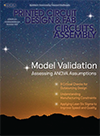SCOTTSDALE, AZ, Sept. 9 - Advanced Systems Consultants (mpcps.com) is offering a three-day course on Machine and Process Capability Analysis and Improvement on November 8-10 at its Scottsdale facility. Mario Perez-Wilson, one of the original architects of Six Sigma, will teach participants practical methodology for efficiently characterizing, optimizing and controlling machines and processes.
The application-oriented course will focus on improving processes by maximizing yields, reducing scrap, minimizing defective rates and increasing the efficiency of manufacturing. Process delineation, metrology characterization, capability determination, optimization and control will be covered in-depth.
Perez-Wilson has over 23 years of industrial experience in engineering, quality and process improvement and is the author of nine books. He has served at the executive level as corporate vice president of quality for Flextronics International.
FRANKLIN, MA, Sept. 7-- Speedline Technologies Inc. (speedlinetech.com) reported second quarter sales up 61% over the same period last year. Bookings also rose, growing 85% over Q1 2003. At the end of the period, the business backlog was 3.5 times higher than at the same time last year.
"We saw continuation of the rigorous market recovery in electronics manufacturing that started in the first quarter," said Pierre de Villemejane, Speedline's president. "Cell phone and computer production was exceptionally strong, driving higher spending for capital equipment to expand capacity."
For the first half of 2004, sales were up 52% over the same period last year, while bookings climbed 69%.
de Villemajane indicated that sales were strong across all geographic regions: "In the Americas, electronics capital spending was expansion-driven, and our large contract electronic manufacturing customers invested heavily in new equipment. Mexico and Brazil also exhibited particularly strong signs of recovery."
According to de Villemejane, Hungary has emerged as the fastest growing European market. The expansion of lead-free processing is also driving growth in the U.K., Poland, Czech Republic and Turkey. Speedline's fastest growing Asian markets are China and Thailand.
In a statement, Fluke said it is consolidating its base of EMS providers. Plexus may in the future take over new product introduction, including design, prototyping and test.
"The latest numbers reflect a slower growth rate for worldwide sales of semiconductors as previously projected," said SIA president George Scalise. "A combination of factors - consumer uncertainty, inventory accumulation in key sectors, and seasonal issues in some markets - resulted in modest sequential sales growth from June.
Nevertheless, year-on-year sales were up 37.9% as demand for ICs continues to rage worldwide. The data are based on a three-month moving average of sales activity by 66 reporting semiconductor firms.
SIA predicted a strong finish to 2004. SIA guided for third-quarter sequential growth of 4 to 6%. "The industry remains on track for year-on-year growth of approximately 28% and record sales of $214 billion," Scalise said, citing the strong U.S. economy for creating favorable conditions for sales of PCs, autos, and consumer electronics.
"If these end-markets follow normal seasonal patterns, we expect to see solid growth rates for the semiconductor industry through the remainder of the year," Scalise said.
Inventory levels remain considerably lower than comparable levels in summer 2000. "There are also indications that consumer concerns over issues such as oil prices, the U.S. elections, and geopolitical developments are affecting household spending patterns.
Sales growth rates slowed sequentially in all regions except Europe. According to VLSI Research, capacity utilization is forecasted to decline slightly from 95% in the second quarter to 93% in the third.
TEMPE, AZ, Sept. 2 - The rate of growth in the manufacturing sector slowed in August but new orders and production remained strong. Manufacturing grew for the 15th consecutive month, said the Institute for Supply Management, based on its monthly poll of the supply chain.
The PMI, a leading measure of economic activity, was 59%, down 3 points and breaking a string of nine straight months above the 60% level. Still, the PMI was above the benchmark 50% level for the 15h straight month. New orders fell 3.5 points and production dropped 6.6 points.
Respondents focused on energy costs, price inflation in basic materials and slowing sales growth. "While the near-term outlook remains positive, both the inventories and customers' inventories indexes show signs of inventory building," ISM chairman Norbert Ore said. "Such a build may be justified if it is to meet additional sales demand, and if new orders and production remain strong."
Prices manufacturers pay were higher, driven by customer demand and energy costs. Customer inventories remain "too low," ISM said, although the rate of decline decelerated significantly during August. Backlogs rose, as did new export orders and imports.
Electronic Components and Equipment, and Industrial and Commercial Equipment and Computers were among the sectors reporting growth.
April May June July August
PMI 62.4 62.8 61.1 62.0 59.0
New orders 65.0 62.8 60.0 64.7 61.2
Production 67.0 64.8 63.2 66.1 59.5
Inventories 44.8 49.3 51.1 49.9 51.7
Customer inventories 40.5 37.0 39.0 37.5 45.5
Backlogs 66.5 63.0 58.5 58.0 55.0
Source: Institute for Supply Management, September 2004Next month in Hong Kong is electronicaAsia, an exhibition for components, assemblies, production and display technology. The Oct. 13-16 show will be held concurrently with the Hong Kong Electronics Fair.
electronicaAsia is the largest electronics manufacturing show is Asia. According to show producers Messe Munchen, last year's electronicaAsia had more than 28,000 trade visitors, up 75% from 2002, and 552 exhibitors.
Automotive electronics will take top billing at electronica 2004 in November in Munich. Automotive accounts for 17% of the overall semiconductor market in Europe, 30% in Germany, thanks to demand for engine-control units, electronic-dashboard instrument clusters, remote keyless-entry systems and airbags.
electronica 2004 will be held Nov. 9-12.
Press Releases
- Altus Partners with Sellectronics to Enhance Manufacturing Capabilities with PVA Delta 8 System
- ITW EAE Celebrates Major Milestone in Domestic Manufacturing Expansion
- Micro Technology Services Selects PBT Works CompaCLEAN III for Advanced PCB Cleaning Performance
- Indium Corp. is Electrifying the Future with Advanced Materials Solutions at Productronica


